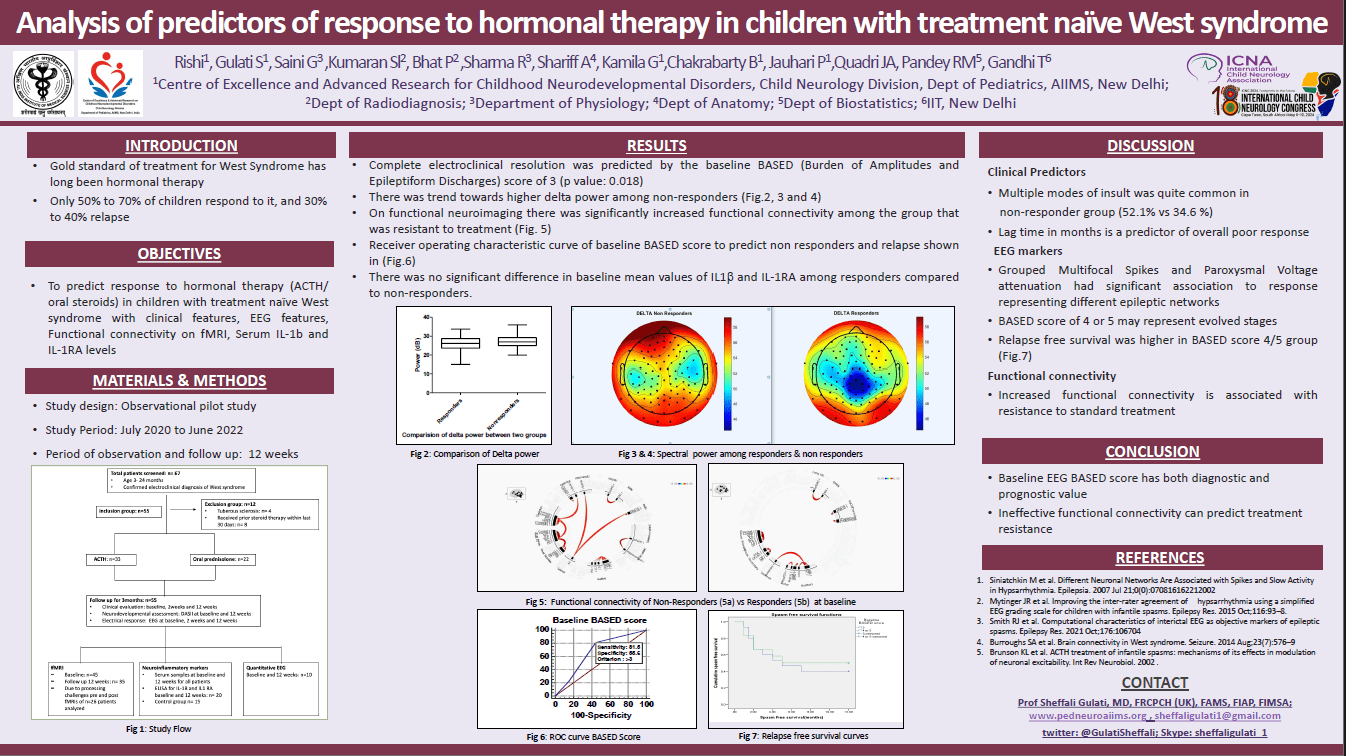Predictors Of Response To Hormonal Therapy In Children With Treatment Naïve West Syndrome: An Observational Study
Background: The gold standard of treatment for West Syndrome(WS) has long been hormonal therapy, but only 50-70% of children respond, while 30-40% relapse.
Objective: To predict response to hormonal therapy(ACTH/oral steroids) in children with treatment naïve WS using clinic-electrographic features, functional connectivity-fMRI, serum IL-1β and IL-1RA levels.
Methods: Children upto 2-years with electro-clinical diagnosis of WS with clinical spasms in the last 48 hours were included. Burden of AmplitudeS and Epileptiform Discharges(BASED) score was done on most severely abnormal 5-minutes sleep epoch which would provide the highest score. All of them underwent Q-EEG, fMRI and serum samples for IL-1β and IL-1RA levels were collected.
Results: Fifty-five children who were scheduled for hormonal therapy during the study period were included. No clinical characteristics at baseline had statistically significant association with non-response/relapse to hormonal treatment. Complete electroclinical resolution was predicted by the baseline BASED score of 3(p-value: 0.018). Area under the BASED score(cut-off >3) ROC curve-0.67(95%CI: 0.53-0.8); sensitivity-81.5%(95%CI: 61.9-93.7); specificity-55.6%(46.5-80.3). On functional neuroimaging there was significantly increased functional connectivity among the group that was resistant to treatment. There was no significant difference in power spectral density for the five-frequency band and the baseline mean values of IL1 and IL-1RA among responders and non-responders.
Conclusion: Baseline EEG based score has both diagnostic and prognostic value in management of West syndrome. Compared to Grouped Multifocal Spikes with Paroxysmal Voltage Attenuation, Multifocal Epilepsy Hypsarrhythmia Pattern exhibited significantly Higher Relapse Rates. Increased delta power could be a potential prognostic marker of non-responsiveness to hormonal therapy.
Rishi Sharma
All India Institute of Medical Sciences
India
Sheffali Gulati
All India Institute of Medical Sciences
India
Gaurav Saini
All India Institute of Medical Sciences
India
Senthil Kumaran
All India Institute of Medical Sciences
India
Priyanka Bhat
All India Institute of Medical Sciences
India
Ratna Sharma
All India Institute of Medical Sciences
India
Shariff Ahmadulla
All India Institute of Medical Sciences
India
Gautam Kamila
All India Institute of Medical Sciences
India
Prashant Jauhari
All India Institute of Medical Sciences
India
Biswaroop Chakrabarty
All India Institute of Medical Sciences
India
Ravindra Mohan Pandey
All India Institute of Medical Sciences
India
Tapan Kumar Gandhi
Indian Institute of Technology
India
